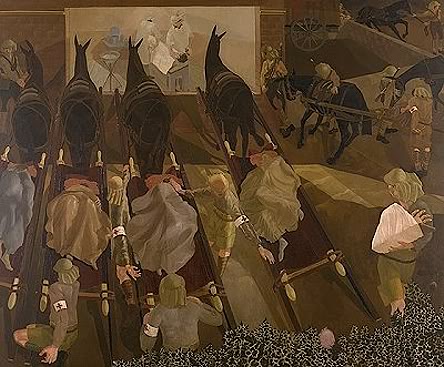4 may 2007
Romance at Short Notice
6 may 2007

Stanley Spencer, Travoys Arriving with Wounded at a Dressing-Station at Smol, Macedonia, September 1916
Spencer wrote: 'This picture is not in any material or practical sense a truthful representation of the scene it is supposed to depict.'
All of the commentaries talk about about the spiritual aspects of
the picture; Spencer himself was keen to emphasise 'God in the bare
real things, in a limber wagon, in ravines, in fouling mule lines'. But
what no-one mentions is what seems clearest to me, that one of the
strongest echoes here is of a Nativity/Epiphany scene: the mules
looking into the circle of light at a helpless recumbent figure.
Columba aspexit
per cancellos fenestrae . . .
7 may 2007
8 may 2007
For the curious there are two Icelandic foods that should certainly be tried. One is Hákarl,
which is half-dry, half-rotten shark. This is white inside with a
prickly horn rind outside, as tough as an old boot. Owing to the smell
it has to be eaten out of doors. It is shaved off with a knife and
eaten with brandy. It tastes more like boot polish than anything else I
can think of. The other is Reyngi. This is the tail of the
whale, which is pickled in sour milk for a year or so. If you intend to
try it do not visit a whaling station first. Incidentally, talking
about pickling in sour milk, the Icelanders also do this with sheeps'
udders and the result is surprisingly very nice.
- Auden & MacNeice, Letters from Iceland
9 may 2007
10 may 2007
24 may 2007
Thinking about toxophily, it came to me today why it was that Zeno
picked an arrow for his example. When you fire an arrow from a powerful
bow, it's first with you, and then upon an instant it appears somewhere
else (sproing!), at a distance. Leading inexorably to the question, where was it in between? Was it in between? Yes, in spades, your man decides.
But the question would never have arisen if he'd looked at a runner, because a running man is obviously always somewhere. Greece, it usually was in those days.
But the question would never have arisen if he'd looked at a runner, because a running man is obviously always somewhere. Greece, it usually was in those days.


